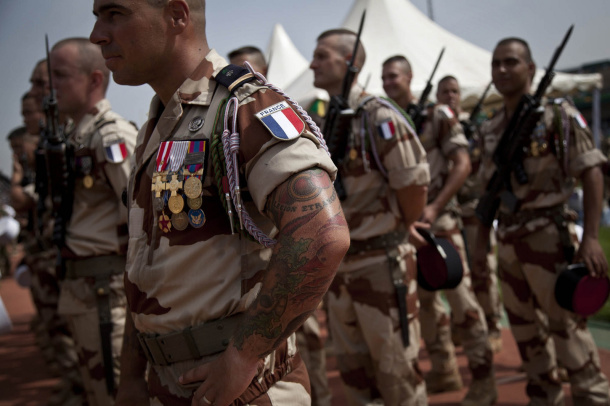By Jackson Webster:

Since the end of the Cold War, American and European military forces have struggled to find a new purpose. Today’s military policy choices are driven by two conflicting philosophies.
The first is continued concentration on the maintenance of large conventional forces by NATO powers. Accompanying this maintenance of hard power capability is its frequent application since the mid-1990s in long-term military commitments to unconventional conflicts in the Middle East and Africa. Interventions of arguably limited success from Lebanon to Afghanistan, Iraq to Somalia are the most publicised and perhaps most controversial feature of many NATO member states’ foreign policies.
The second, more populist realm of thought is one of reluctance. Western voters, and consequentially the politicians which cater to them, speak vehemently against expensive wars on foreign soil. The Bush and Blair administrations were defined largely by their overseas entanglements, not by their domestic or diplomatic policies. If the West is to reconcile its competing paradigms concerning interventions and military action, it must look to a place that military thinkers rarely consider: France.
Over the past decade, Paris has slowly reasserted itself, primarily in Northern Africa and the Sahel, through a number of relatively quiet and relatively successful military interventions. French military capacity is often ignored in popular discourse; Paris’ capabilities include one of the world’s most modern naval and air forces and an average overseas deployment of 30,000 troops at any given time. France’s continued military presence in a number of outlying former colonial states affords Paris power-projection capabilities far beyond ‘France-Métropole’.
The causes of recent French military ventures have differed greatly from case to case, but they share three essential characteristics. Firstly, Paris generally pursues actions which receive global diplomatic approval. Both the Libyan and Malian interventions were sanctioned by UN resolutions and France achieved diplomatic consent for action from regional powers: the Arab League in the case of Libya and Nigeria, Chad, and Niger in the case of Mali. By exercising this kind of restraint, Paris is able to add political legitimacy to its applications of hard power in a way that American-style unilateral military deployments have not.
Secondly, the interventions themselves have been carried out by small numbers of elite forces with specific, tactical goals. French forces conduct combat operations with little pomp and circumstance. The press was initially not allowed to follow French special forces into the tribal Toureg regions of Mali and was only allowed to cover in earnest the insertion and departure of French forces in Bamako. Furthermore, French troops are generally not sent abroad for nation-building purposes. Paris gives its forces tactical objectives and withdraws once security is achieved.
Thirdly, and most importantly, Paris has only sought intervention when a viable power structure exists to take over once the presence of French troops has stabilised the situation. Due to the previously discussed sparse press coverage, France’s interventions are typically less concerned with performing a political stunt and instead focus on the limited goal of stability and security. This is most clearly exemplified by the choice to intervene in Chad in 1983-84, not on the basis of humanitarianism, but with the goal of ending violence and stabilising the local security situation. François Mitterand’s intervention in Chad saw a rapid deployment of 3500 French troops to draw a ‘line in the sand’ at the 16th parallel across which neither Libyan nor Chadian forces would be allowed to perform military operations.
The crucial aspect of Paris’ military adventures has been the viability of an exit strategy. American interventions in Vietnam, Korea, and Iraq predated a clear understanding of strategies of limited warfare. In these examples, conventional forces were deployed with no ultimate vision for the operation beyond an initial conventional victory. This resulted in the all-too-familiar American exit strategy of first declaring victory, then unceremoniously ending the intervention, such as Bush’s ‘Mission Accomplished’ blunder in Iraq.
With each case for post-colonial France, Paris has allowed for a locally-driven exit strategy. In Chad, the French ‘line in the sand’ created a de facto ceasefire line and quickly ended the conflict, preserving the sovereignty and stability of both states involved. In Mali, French troops are being replaced by ECOWAS forces and the Malian government in Bamako has successfully remained in power.
The French formula of low profile, low-troop commitments, exit-viable interventions should be the future of Western conventional military operations. These recent examples are especially appropriate to examine as the Syrian Civil War enters its fourth bloody year, and as the coalition attacks on ISIS have proved insufficient thus far. When the choice to avoid ground intervention in Syria is eventually examined by the academics of the future, the analysts will have to ask themselves what kind of forces would have been appropriate and if a viable exit strategy was ever possible. Many criticise the very institution of military intervention, but if Western military forces are to be worth the significant resources required to sustain them, policy-makers will have to assess how best to apply their tools at hand to assure stability in the international order.
Jackson Webster is a student of International Relations at the Department of War Studies, King’s College London.
